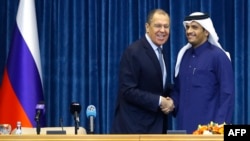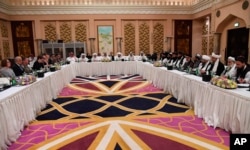Qatar’s foreign minister Monday appeared upbeat about "a successful" conclusion of negotiations his country is hosting between the United States and the Taliban to help find a political settlement to the war in Afghanistan.
Sheikh Mohammed bin Abdulrahman al-Thani told a joint news conference with visiting Russian Foreign Minister Sergey Lavrov that Doha will continue to play its role in "coordination and consultation" with international partners to achieve Afghan peace.
"At the end, the result and peace cannot be brought by force or war. It has to be brought by talks and Qatar is continuing its role as a mediator… We hope that we’ll have a successful outcome very soon," noted al-Thani.
This is the first time a top Qatari official has publicly commented since the U.S.-initiated peace dialogue with the Afghan insurgent group began late last summer in the Gulf nation, which also hosts Taliban’s informal political office.
Taliban and American officials have for the past several days held marathon meetings in Doha, including one Monday, in their bid to finalize a draft agreement on a potential foreign troop withdrawal from Afghanistan conditioned on insurgent guarantees that it would prevent terrorists from using Afghan soil for attacks against the U.S.
"We appreciate everyone involved in building peace and stability into Afghanistan because we believe this is to the benefit of everybody," said the Qatari foreign minister.
Lavrov, who is in Doha on the first stop of a Gulf tour, reiterated Moscow’s backing for the Afghan peace effort.
"We do follow, we do monitor the talks between the United States and the Taliban," said the Russian foreign minister.
He added that Moscow is playing its role in mobilizing the international community, especially neighbors of Afghanistan, to help launch an Afghan political process. Lavrov noted that Moscow and Washington are in "a good contact" with each other over the Afghan peace process.
"I think this is very useful instead of being rivals and having this kind of artificial competition. We should work together … we can all help the people of Afghanistan to launch this national dialogue which alone can resolve and stop this conflict," Lavrov emphasized.
'Steady progress'
The Taliban announced last week the talks with the U.S. were making "a steady progress" and vowed to remain engaged in the process until achieving results. But media reports have speculated about a stalemate in the talks, prompting a Taliban spokesman to try to dismiss the speculation through a statement he issued to media late Sunday.
"The current round of talks in Doha are advancing on a step-by-step basis. As the issue at hand is immensely crucial and delicate, it’s progression is taking place with that much care and vigilance," Zabihullah Mujahid explained.
Mujahid emphasized again the two sides primarily have focused on fleshing out "the details and nature" of the U.S. troop withdrawal in exchange for Taliban’s counterterrorism guarantees.
"It should be mentioned that no understanding has so far been reached about any agreement or document," the spokesman said.
The U.S. special envoy for peace in Afghanistan, Zalmay Khalilzad, has repeatedly stated in recent weeks that before reaching a final agreement he would want a Taliban ceasefire and the opening of direct talks between the insurgents and the Afghan government. The Taliban refuses any direct engagement with Kabul until it secures a troop withdrawal deal with Washington.
The U.S. has not made any fresh comments about the talks but Khalilzad last week, in a series of tweets, described his ongoing meetings with Taliban negotiators as productive.
The peace effort comes as Taliban insurgents continue to stage major attacks, including one over the weekend at a military air base in southern Helmand province. That assault killed dozens of Afghan security forces but a U.S. military spokesman rejected as false Taliban claims that American soldiers, who are also stationed at the base, were among the casualties.






